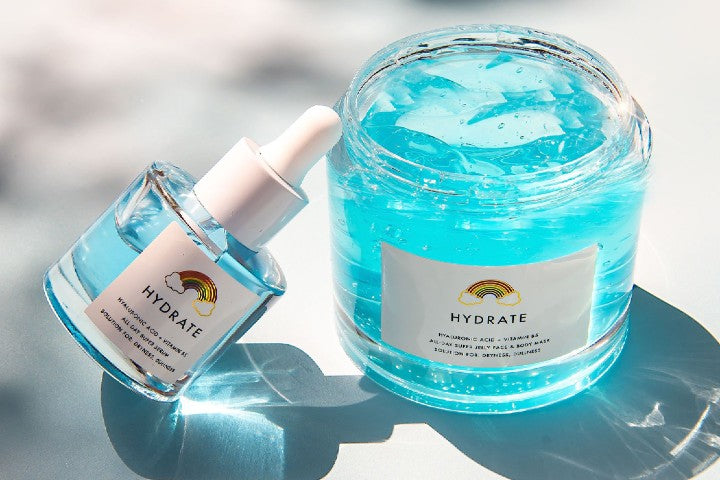8 Skincare Ingredients to Avoid During Pregnancy

Pregnancy is a wonderful time, but if you’re someone who loves following a multi-step skincare routine filled with serums and creams, you do need to be especially careful what you’re putting on your face — or anywhere else on your body for that matter.
Certain skincare ingredients can be harmful to pregnant women and the fetus. Since there’s increased systematic blood flow in the body whilst pregnant, skincare ingredients absorbed into the skin may pass into the bloodstream, and this can have a negative effect on your baby. The skin is also more sensitive during pregnancy, leaving moms-to-be prone to irritation to ingredients they usually wouldn’t be sensitive to.
To keep your baby healthy and your skin glowing throughout the months, here are eight skincare ingredients to avoid during pregnancy — and ones to use instead.
#1: Retinoids
And by retinoids, we mean Retin-A, retinol, and retinyl palmitate. These should all be avoided during pregnancy. While small amounts of vitamin A are crucial to fetus development, too much of it has been associated with birth defects and liver toxicity.
If you’re someone who lives for the vitamin A derivative, try a gentler, pregnancy-safe skincare ingredient like bakuchiol instead. There are plenty of over-the-counter options that work almost as well as retinol without the risk. Like retinol, bakuchiol increases natural collagen production and speeds cell turnover, helping to erase fine lines, dark spots, and breakouts.
You’ll find bakuchiol in Rainbow’s Glow Bundle, a face mask and serum duo designed to boost your skin’s glow. It’s also made with glycolic acid for gentle exfoliation to dissolve dead skin cells and refresh your complexion.
#2: Salicylic Acid
Typically used to treat acne, salicylic acid is a beta hydroxy acid — or chemical exfoliant — that unclogs pores and clears away blemishes. You’ll find it in everything from cleansers to toners and a variety of other skincare products.
According to dermatologists, salicylic acid is safe during pregnancy in low concentrations of up to 2%. Any higher than that and it could pose a risk to your developing baby. To be extra safe, before using it, check in with your GP or a dermatologist. If you’re unable to use it, they might be able to suggest something else for tackling your acne.
#3: Benzoyl Peroxide
Another acne-fighting ingredient, benzoyl peroxide can be risky for pregnant women. According to the experts, there is some possible risk to the fetus when using benzoyl peroxide in your beauty products. Most would advise against to be on the safe side.
#4: Essential Oils
Essential oils are commonly used in skincare products, and yet they’re not actually assessed by the FDA.
“In general, essential oils can be extremely harmful if not used appropriately,” explains Albert Sassoon, MD, an ob-gyn in Manhattan. “Often they have 50 times the concentration used in a cup of tea and can be harmful even in a nonpregnancy state. The problem also is that we don’t know how much of a specific oil is absorbed.”
Diluted essential oils are definitely safer, however some can still be dangerous to pregnant women. For the sake of you and your baby’s health, better steer clear.
#5: Hydroquinone
This potent skin lightener is a pregnancy skincare no-no! Used primarily for lightening and to treat hyperpigmentation, hydroquinone may be tempting to use to diminish dark spots or melasma during the trimesters. Don’t! All the derms agree that isn’t a safe ingredient for pregnant women.
If you’re looking for a pregnancy safe way to treat pigmentation, try Rainbow’s Smooth Bundle. It features a mask and serum formulated with vitamin C. This powerful antioxidant brightens and reduces the appearance of dark spots and discoloration, promoting a clear and radiant complexion.
#6: Formaldehyde
Formaldehyde used to be found in some professional hair-straightening treatments and nail polishes, but it has become more limited since it was discovered to be a carcinogen in 2014.
According to The National Institute for Occupational Safety and Health, working with formaldehyde may increase the risks of fertility issues or miscarriage.
#7: Parabens
Parabens are often used as preservatives in products like shampoos and lotions. However, research links them to elevated levels of estrogen in the body, which has been shown to increase the risk of breast cancer. For that reason, it’s best to avoid them during pregnancy. If you can, cut them out of your beauty routine completely.
#8: Chemical Sunscreens
Many chemical SPFs contain oxybenzone, avobenzone, octisalate, and octocrylene, which have been linked to birth defects.
One study shows pregnant women in their first trimester who apply SPF containing 6 percent oxybenzone twice a day can absorb the chemical into their bloodstream. According to the experts, it may reach the fetus and cause cell changes.
“That's because oxybenzone is considered an endocrine disruptor, which can have an adverse effect on development, reproductive, neurological, and immune systems,” says Thomas Dardarian, D.O., president of the American College of Osteopathic Obstetricians and Gynecologists in Fort Worth, Texas.
Try using mineral sunscreen instead with SPF 30 or higher. Zinc oxide and titanium dioxide — the two active ingredients commonly found in mineral sunscreens — are considered safe for use by pregnant women.
WHAT SKINCARE INGREDIENTS ARE SAFE DURING PREGNANCY?
You’re not stuck for choice. For starters, if you’re seeking hydration, you can get your daily dose of moisture from hyaluronic acid. You’ll find it in Rainbow’s Hydrate Bundle. It’s gentle on the skin and safe for all skin types. And it’s safe during breastfeeding too!
Other active ingredients you can use include vitamin C, lactic acid, and vegan collagen. Still, stick to using them in small amounts to prevent causing harm to your unborn child. When choosing topical formulations, always choose products with a low concentration of these active ingredients.
We know there’s a lot to think about when you’re pregnant. Unfortunately, the field of skincare is often ignored when it comes to what is safe and unsafe for pregnant women to use. Make sure you acquaint yourself with the skincare ingredients to avoid below, and ensure you and your baby stay healthy — while your skin stays glowing!
